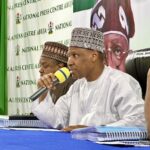Over the weekend President Muhammadu Buhari gave his last Democracy Day speech as president, thus Nigerians should expect to have a brand new president come 2023.
The speech was on a day – June 12th – set aside to mark the year 2022 Democracy Day anniversary as well as an occasion to celebrate freedom from the military rule and return of power to elected civil rule.
- Kaduna inaugurates officials for 2022 Hajj
- Hijab crisis: Kwara Muslims demand name change of public schools
On June 12th 1993, Nigerians trooped out during a general election to elect their leaders but the military junta led by General Ibrahim Badamasi annulled what has been described as the best presidential election so far.
According to President Muhammadu Buhari, “It is important for all of us to remember that June 12th, 2023 will be exactly 30 years from the 1993 presidential elections. In honour and memory of one of our national heroes for democracy, Chief M.K.O Abiola, GCFR, we must all work together to ensure this transition is done in a peaceful manner.”
All registered political parties, according to the president, have conducted primaries to select their candidates for the 2023 general elections, which were peaceful and orderly.
The questions however are – would those who won, be magnanimous in their victories and those who lost, gracious in defeat? Would those aggrieved opt to seek judicial justice as opposed to jungle justice?
According to the former President of the Court of Appeal (PCA), Justice Zainab Bulkachuwa, “since the return of democracy in Nigeria in 1999, the judiciary has been playing a key role to sustain it by way of adjudicating in all cases that arose from pre-election activities, the election petition arising after the four-yearly general elections and the appeals to the appellate courts arising from the decisions of the various election tribunals and the appeals therefrom.”
Incumbent President of the Court of Appeal (PCA) Justice Dongban-Mensem under Section 285 (1) of the 1999 Constitution is empowered to exercise her constitutional powers before the upcoming general elections and set up Election Petition Tribunals (EPTs) in all the states of the federation to hear and determine election petitions.
According to Justice Helen Moronkeji Ogunwumiju, Justice of the Supreme Court (JSC), “the judiciary has through the election petition tribunals and appeals has assisted greatly in the credibility of elections in Nigeria. The Court of Appeal from our observation has been very strategic in its management of the process. It is therefore hoped that the existing legal frameworks made up of the Nigerian Constitution and the Electoral Act will continue to empower the judiciary in order to sustain the momentum and deepen democracy in Nigeria.”
How the election petitions fared in Nigerian democracy is no longer a domestic issue but an issue that has attracted global attention. Hence it was a good development that for the first-time former President Goodluck Ebele Jonathan, who lost the Presidential elections in 2015 to the incumbent President Buhari, did not challenge the validity of the election result, hence there was no need to establish a Presidential Election Petition Tribunal.
Investigation reveals that the election petition tribunal assignment for judges are very demanding, enormous and laborious. As judges involved are usually overstretched in the process and would have to put in their best and abide by their oath of office. Judges sometimes would forego their christmas vacation and deployed by the president of the Court of Appeal from various jurisdictions in Nigeria and posted to other states to handle the petitions despite the general insecurity nationwide.
According to Justice Peter Obiorah, there are already some settled areas of law. These areas include – the sanctity of the 180 days stipulated for the determination of an election petition and 60 days for an appeal; the method of application for issuance of pre-hearing notice; and that an interlocutory appeal shall not operate as a stay of proceedings.
Justice Helen Moronkeji Ogunwumiju, said that the introduction of time limit for hearing and determination of election petitions and appeals was a child of necessity borne out of the scandalous delays in the determination of election petitions in the past.
The amendment to the constitution relating to a time limit, according to her, has placed tremendous pressure on the justices of the Court of Appeal.
“I must hastily say that without the 180 days’ time limit on the tribunals and 60 days on the appellate courts, election petitions and appeals would have gone on ad naseum as it was in the past to the detriment of speedy administration of justice.

 Join Daily Trust WhatsApp Community For Quick Access To News and Happenings Around You.
Join Daily Trust WhatsApp Community For Quick Access To News and Happenings Around You.

